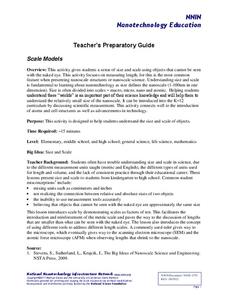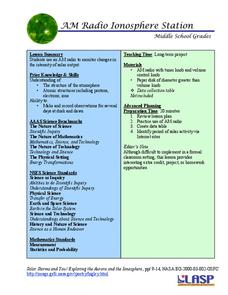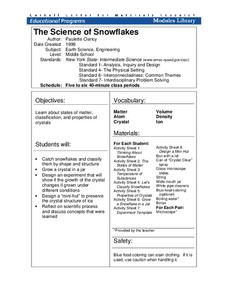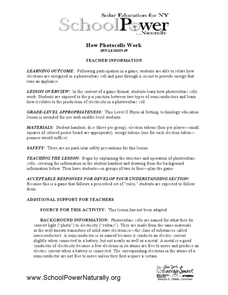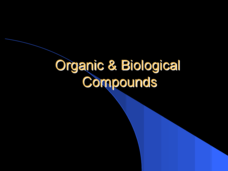Royal Society of Chemistry
Shapes of Molecules—Hybrid Orbitals
Take your chemistry class' knowledge of molecular geometry to the next level! Introduce orbital hybridization with a series of related games. Individuals complete a data table in the first activity, then solve Sudoku-like puzzles using...
National Nanotechnology Infrastructure Network
Scale Models
With instructions to adapt the activities for any grade K-12, any teacher can incorporate the concept of scale into the classroom with a simple, yet effective lesson.
SRI International
Science of Water
Water is crucial to survival. Scholars gain an appreciation for water by reading about it, learning about its atomic properties, and investigating its properties through six stations in a lab activity.
PHET
AM Radio Ionosphere Station
Tune in! Young scientists use an AM radio at home to monitor solar output. The long-term project would be ideal in a flipped classroom or as an out-of-class project.
Cornell University
The Science of Snowflakes
Who can grow the best crystals? Challenge class members to develop strategies for enhancing growth in the crystals. Through a lab investigation, learners study the properties of crystals and test the effectiveness of different...
Curated OER
Ionic Nomenclature
One document contains five different worksheets for practice naming and writing formulas for ionic compounds. The first is particularly notable, as it systematically walks beginning chemists through the process of using the periodic...
Curated OER
Chapter 6 - Bonds
Although there are only 16 questions here, this chemistry handout makes a terrific unit assessment. It queries youngsters on the properties of ionic and covalent compounds, relates bond length tho stability and enrgy, compares polar and...
Teach Engineering
What is a Nanometer?
Teams learn about the size of a nanometer by measuring objects and converting those measurements. A worksheet then tests the groups' abilities to use nanometers by having them determine the size of objects that are too small to...
University of Colorado
Clay Planets
Why do scientists use models? In the first installment of 22, groups create scale models of our solar system. They then share and discuss their models.
Royal Society of Chemistry
Shapes of Molecules—Distortion from the Pure Geometry
Ready to introduce the realities of molecular geometry to chemistry pupils? Use a logic-based interactive! Perfect as individual practice, the puzzles explore the bond angles and repulsions present in three common molecular shapes.
Cornell University
Thin Films
Combine mathematics and science to calculate measurements of unmeasurable materials. Individuals use knowledge of density and volume to determine the thickness of the film used in production. They also apply stoichiometry to...
Curated OER
Molecular Modeling Activity
Young scholars explore the concept of molecular modeling and differentiate between saturated and unsaturated compounds. In small groups, they identify molecular formulas, complete a chart comparing alkanes, alkenes, and alkynes, and...
Curated OER
EGG-cellent POLYMER PACKAGING DESIGN
Pupils investigate the concept of a polymer using an experimental design of protecting an egg in a bookbag. They test the properties of polymers and form an educated solution to the proposed problem. Then they describe the steps used in...
Curated OER
A Pre-Treatment Model for Ethanol Production Using a Colorimetric Analysis of Starch Solutions
Learners recognize the benefits of ethanol and study photosynthesis. In this ethanol lesson plan students complete an experiment that shows the procedure that starch can be hydrolyzed by salivary amylase.
Curated OER
Modeling the Process of Mining Silicon Through a Single Displacement/Redox Reaction
Students study silicon and where it comes from. In this solar mining lesson students complete an Internet search of mining and a lab activity.
Curated OER
Renewable Energy Plants in Your Gas Tank: From Photosynthesis to Ethanol
Students examine the role photosynthesis plays in plant survival. In this renewable energy instructional activity students document their observations and analyze and interpret their results.
Curated OER
How to identify a physical change from a chemical change
Students identify the difference between some physical and chemical properties and compare some physical and chemical changes. They design an experiment to distinguish between a physical or a chemical property of their choice.
Curated OER
Stereochemistry Problem Set 9
In this chemistry worksheet, young scholars write how many chiral C's are in each of the compounds listed. Then they draw the Fischer projections for all stereo isomers in 5 and in 6. Students also match the correct Fischer projection to...
Curated OER
Fusion Confusion
Learners are introduced to three types of energy transfer: conduction, convection, and radiation. They model the scientific process of fusion to become with the sun and how it produces energy.
Curated OER
How Photocells Work
Give small groups of physical scientists tokens that represent electrons in a photovoltaic cell. They play a dice game in which they move the tokens around, representing the flow of electrons through the p-n junction of a semiconductor...
Curated OER
Chemistry Comes to Life
Although biochemistry of the human body is a vital topic, it doesn't have a chapter dedicated to it in many biology textbooks. If that's the case with your text, you can use this resource as a guide for designing your own lecture and as...
Curated OER
Organic and Biological Compounds
Carbon as a building block for organic compounds is demonstrated by diagrams and facts for its bonding style. Saturated and unstaturated hydrocarbons are detailed and facts about biological compounds such as proteins, nucleic...
University City High School
Metabolism Lesson Plan
Not a lesson in the traditional sense, this is a collection of resources with which you can craft a lesson on metabolic processes. It includes an outline of topics, some brief discussion, and a large array of animations, images, and...
Curated OER
Molecular Models of Functional Groups
In this molecular model worksheet, students use a molecular model kit to construct 13 different molecule models. After constructing the molecules, the students complete 32 short answer questions.
Other popular searches
- Atomic Structure
- Atomic Structure Time Line
- Atomic Structure Crossword
- Atom Structure
- Atomic Structure Lesson Plan
- Atomic Structure Worksheet
- Basic Atomic Structure
- Atomic Structure Bohr Model
- Atomic Structure Interactive
- Chemistry Atomic Structure
- Atomic Structure Lewis Dots
- The Atomic Structure

